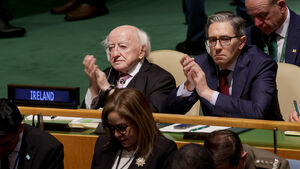Roscommon Herald opinion: President is expected to remain above politics

President Higgins along with Taoiseach Simon Harris during the opening session at the United Nations in New York . Pic Maxwells
The President is in the news again, and for some of the older generation, there may be a sense of nostalgia for a time when figures like Hillary and his predecessors quietly occupied Áras an Uachtaráin, speaking little and certainly avoiding disputes with foreign nations. However, times have changed, and our current president is far from quiet. He is outspoken on numerous issues, especially human rights and global affairs.
This, of course, is no surprise, given that he was always vocal long before his presidency. His political stance has always leaned further to the left than many in Ireland, and his admiration for leaders like Castro shouldn’t come as a shock.
Last week, at the United Nations General Assembly, President Michael D. Higgins was involved in a dispute with the Israeli administration over a letter he wrote to the newly elected Iranian president, congratulating him on his election. The Israeli embassy in Dublin circulated the letter, and media reports suggested that President Higgins accused the embassy of leaking it. However, it turns out that the Iranian Foreign Affairs department initially shared Ireland’s message of congratulations, and the Israelis simply used it again.
The President understandably felt that Israel was using the letter to undermine Ireland, painting the country as being aligned with Iran, Israel's staunch enemy. The controversy continued for a second day, but things escalated when both the Taoiseach and Tánaiste had to step in to defend the President, explaining that such congratulatory letters are part of diplomatic protocol, similar to expressing sympathy for nations when leaders pass away. This incident brings to mind de Valera’s controversial decision during World War II, when he offered condolences to the German embassy after the death of Adolf Hitler. One wonders—if given the chance—would de Valera have made the same decision today?
This situation got me thinking about the presidency itself and whether it’s really a role suited for people in their eighties. We see a similar debate unfolding in the US. There’s a clear distinction between the two roles: one is largely ceremonial, while the other holds immense power. Still, there are parallels between the Irish and American presidents—both are octogenarians, and both face their share of controversies.
However, our president remains mentally sharp, with only his mobility showing signs of age. The situation in the US, especially following that now-famous debate after which the president finally indicated he wouldn’t seek re-election, offers a different picture. Meanwhile, the other man looking to be US president is also well into his later years. It might help the younger Democrat lady, Kamala Harris.
As for our own president, his term will end in about a year, and this time next year, we’ll be in the midst of a presidential election. Who the candidates will be is anyone’s guess. Some speculate that Micheál Martin might run. Would he be willing to step down as leader of Fianna Fáil and potentially from his role as Taoiseach or Tánaiste to move to Áras an Uachtaráin? I think he would. At 64, he is relatively young in comparison to others being discussed. Bertie Ahern, for instance, is 73.
Does age matter? Former US President Jimmy Carter just turned 100 today. He left office in 1980, replaced by Ronald Reagan, who at 73 became the oldest US president during his first term. Reagan served four more years, though it's widely believed that he was suffering from dementia during the later stages of his presidency. Ireland has a minimum age of 35 to contest the presidency. Is it fair? Should there be a maximum age? Or would that be unfair?
Regardless of fairness, the fact remains that in Ireland, the president’s role is largely ceremonial. The officeholder is expected to remain above politics and avoid embarrassing the government. However, President Higgins has developed into the public conscience of Ireland, and his statements often resonate with the public, even if they anger the government.
For instance, when he described Fidel Castro as a “giant among global leaders,” it caused a stir. He has also called the government’s housing policy a “disaster,” claiming it had moved beyond crisis levels. He warned that due to high youth unemployment, Ireland was “sleepwalking into disaster.”
While many agree with his observations, there are times when silence might serve the national interest better. Recently, I mentioned Ireland’s place in Europe and the need to reassess our approach. Our President famously criticised Ursula von der Leyen, the European Commission president, for her “thoughtless and even reckless” stance on the Israel-Hamas conflict.
While much of what President Higgins says reflects the nation’s conscience, it may not always reflect well on the office itself. As he continues his remaining 14 months in office, leadership will remain key. He has served for thirteen years, and in the remaining time it’s important that he continues to uphold the dignity of the presidency.





